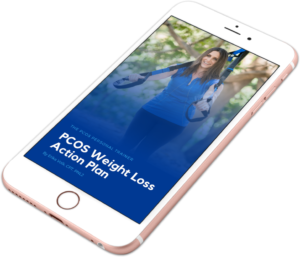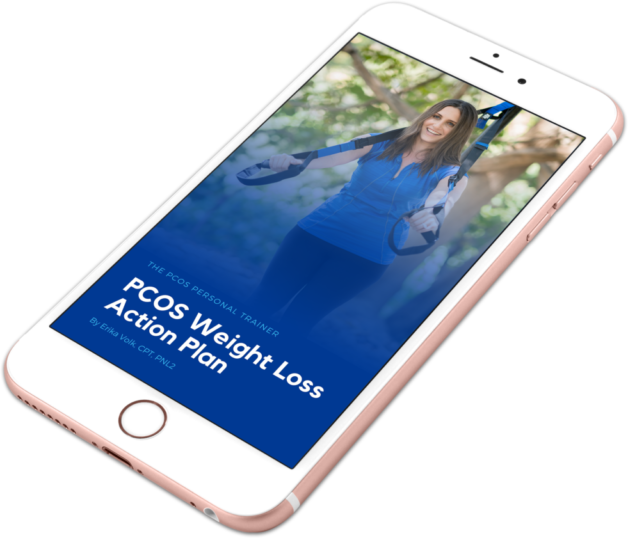Top PCOS doctors recommend that their patients strength train. Strength training helps women with PCOS balance hormones naturally and increase their metabolism so that they look and feel their best.
Polycystic Ovarian Syndrome is an endocrine or hormonal disorder. Basically, our bodies produce and react to certain hormones like insulin and androgens differently than other women. It is estimated that 15% of women worldwide are living with PCOS. PCOS is commonly considered a fertility disorder, but is much more extensive than that. It impacts many aspects of health, including metabolism, heart health, cancer risk and mental health. PCOS affects women at every age and stage of life. Even if you’re not looking to get pregnant, it is vital to your long-term health that you manage your PCOS.
PCOS is not your fault. If at any point, you were made to feel like you brought all of these lousy symptoms on yourself, go ahead and scrub that thought from your brain. The idea that women give themselves PCOS is deeply flawed, to say the least, and it needlessly shames PCOS patients.
The medical community is not sure what exactly causes PCOS. However, it seems that PCOS runs in families and is aggravated by our modern lifestyle. Some experts think of PCOS as an epigenetic condition. I find that this is the most helpful way to approach PCOS. Epigenetic traits are genes that express themselves under certain environmental conditions like stress, chemical exposure, diet, and other lifestyle factors like how often you exercise. A woman with PCOS can make the same lifestyle choices as a woman who does not have a genetic predisposition for PCOS and see much different results. You’ve probably have noticed this yourself: you gain weight much easier than your friends, or maybe you seem to get tired more than other women your age. And you have probably thought this was pretty unfair. It might make you angry or concerned that you’re imaging the severity of your symptoms.
Is my body sabotaging me? I get asked this a lot. Many women feel like PCOS has taken over their body and that their symptoms are keeping them from being the best version of themselves. When you feel tired, sick, and stressed about a medical condition, enjoying life can feel impossible. The good news is that changing your lifestyle will alleviate symptoms, so that you can feel like yourself again. The first step toward healing is learning a little bit about what is going on in your body.
Belly fat, low energy, and carb cravings are caused by insulin resistance.
Genetic and environmental factors make women with PCOS prone to insulin resistance. One of the insulin hormone’s jobs is to take the glucose that comes from digested food and get it into your cells, where it can be used for energy. The cells of insulin-resistant women do not respond to a normal amount of insulin, so the pancreas produces higher amounts of insulin to control blood sugar.
But insulin is also your fat storage hormone. So when you have high levels of insulin, your body will respond by storing more fat, especially in your midsection. Belly fat is difficult to lose when insulin levels are high because insulin sends a message to your body that it should hold onto as much fat as possible.
Chronically high insulin levels also contribute to reactive hypoglycemia. In reactive hypoglycemia, high insulin levels cause abrupt drops in blood sugar just 2 to 5 hours after a meal. That dip in blood sugar creates those nasty post-meal carb cravings and energy slumps many of us struggle with.
Out-of-control hunger, trouble losing weight and leptin resistance.
Leptin is a hormone secreted by our fat cells. Our brains respond to leptin by telling our bodies we are full and do not need more food. But women with PCOS – lean and heavy alike – are prone to leptin resistance. This means that, compared to non-PCOS women, our brains do not receive the “I’m full, stop eating” signal from the same amount of leptin. As a result, we overeat which aggravates insulin resistance. And as explained above, insulin resistance tends to result in belly fat.
Androgen imbalances lead to hair and skin problems.
All women naturally produce androgens, as they are necessary for a healthy reproductive system. However, PCOS women convert testosterone into a more potent androgen called DHT at a higher rate then other women. This imbalance in sex hormones leads to hirsutism (excessive facial hair), acne, and female-pattern hair loss.
Difficulty with ovulation causes irregular cycles and fertility issues.
Three important structures are involved in ovulation: your hypothalamus, pituitary gland, and ovaries. They communicate with each other in a complex dance of falling and rising hormones that bring about ovulation. In PCOS, the communication between these three structures is disrupted. This disruption can cause delayed ovulation, ovarian cysts, and in some cases, no ovulation at all. Not ovulating on a regular basis makes it difficult for women with PCOS to maintain regular menstrual cycles and become pregnant.
A PCOS diagnosis can make you feel like a victim of your own body, but nothing can be further from the truth! PCOS responds very well to lifestyle changes. In fact, a healthy lifestyle can eliminate nearly every symptom of PCOS. This is excellent news because it means you’re in the driver’s seat of your health.
Erika's Top 5 ways to manage PCOS
Strength training.
Eat PCOS friendly meals 80% of the time.
A diet of unrefined carbohydrates, lean protein, healthy fats, and plenty of veggies will do wonders for nearly every PCOS symptom from belly fat to acne. You do not have to eliminate whole food groups, do restrictive cleanses, or count calories for the rest of your life. If you consistently eat PCOS-friendly meals, you will improve your symptoms.
Use portion control and hunger awareness.
Maintaining a healthy weight will help PCOS a great deal. However, crash dieting and extreme caloric intake restrictions can cause more harm than good. Whether you are lean or overweight, every woman with PCOS should learn how to recognize her natural hunger cues and how to serve herself an appropriate amount of food.
Manage Stress.
Sleep deprivation, crash dieting, being sedentary, over-exercising, and negative thinking are all forms of stress. When you experience stress, your body has a hormonal response. If you are under chronic stress, your hormones could get even further out of balance. Therefore, managing stress is as important as diet and exercise for PCOS.
Use evidence-based supplements and avoid junk supplements.
Supplements are not magic pills. In fact, even the best supplements for PCOS will not work without a healthy lifestyle. That said, reputable medical studies have identified some supplements that work very well for PCOS.
Get a free copy of Erika's
PCOS Weight Loss Action Plan
Learn some simple steps for getting your weight under control.

You’ll also be automatically signed up to receive even more bonus resources, including 15 PCOS-friendly Recipes You’ll Love and a special PCOS Workout Challenge!

